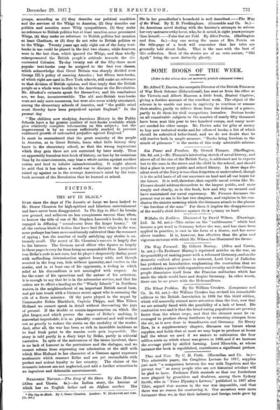FICTION.
THE SPY IN BLACK..
EVER since the days of The Lunatic at Large we have looked to Mr. Storer Clouston for high-spirited and hilarious entertainment and have never been disappointed. In The Spy in Black he breaks new ground, and achieves no leas conspicuous success than when, to borrow the title of one of Mr. Stephen Leacook's books, he was engaged in diffusing "moonbeams from the larger lunacy." Of all the various kinde of fiction that have had their origin in the war, none perhaps has been more asaiduously cultivated than the romance of spying; but the number of really satisfying spy stories is ex- tremely small. The secret of Mr. Clouston's success is largely due to his fairness. The German naval officer who figures so largely in these pages is very far from being an unspeakable Hun. Lieutenant von Beike's code is not ours, but he plays a desperately daring game with unflinching determination against heavy odds, and though wended in the long run, fails without ignominy, and excites in the reader, and in at least one of his opponents, a feeling in which relief at his discomfiture is not unmingled with respect. As for the scene of his operations and the nature of his activities, It is enough to say that he is in the submarine service, and that his orders are to effect a landing on the "Windy Islands" in Northern waters, in the neighbourhood of an important British naval bans, and get into touch with a German secret agent who is assuming the :rile of a Scots minister. Of the parts played in the sequel by Commander Robin Blacklock, Captain Phipps, and Miss Eileen Holland we cannot speak in detail without discounting the joys of perusal If the double or contra-impersonation on which the plot hinges, and which proves the cause of Belke's undoing, is somewhat improbable, it is so plausibly contrived and well worked out as greatly to reduce the strain on the credulity of the reader. And, after all, the war has been so rich in incredible incidents as to lend fresh point to the maxim credo quit& impoesibile. The story is told partly in a diary kept by Balk% partly in editorial narrative. In spite of the seriousness of the issues involved, there is no lack of humour in the portraiture and the dialogue, and we cannot refrain from expressing our admiration at the skill with which Mies Holland in her character of a German agent expresses sentiments which reassure Bence and are yet reconcilable with perfect and ardent loyalty to her country. The claims of the romantic interest are not neglected, and add a further attraction to an ingenious and delectable entertainment.


























 Previous page
Previous page